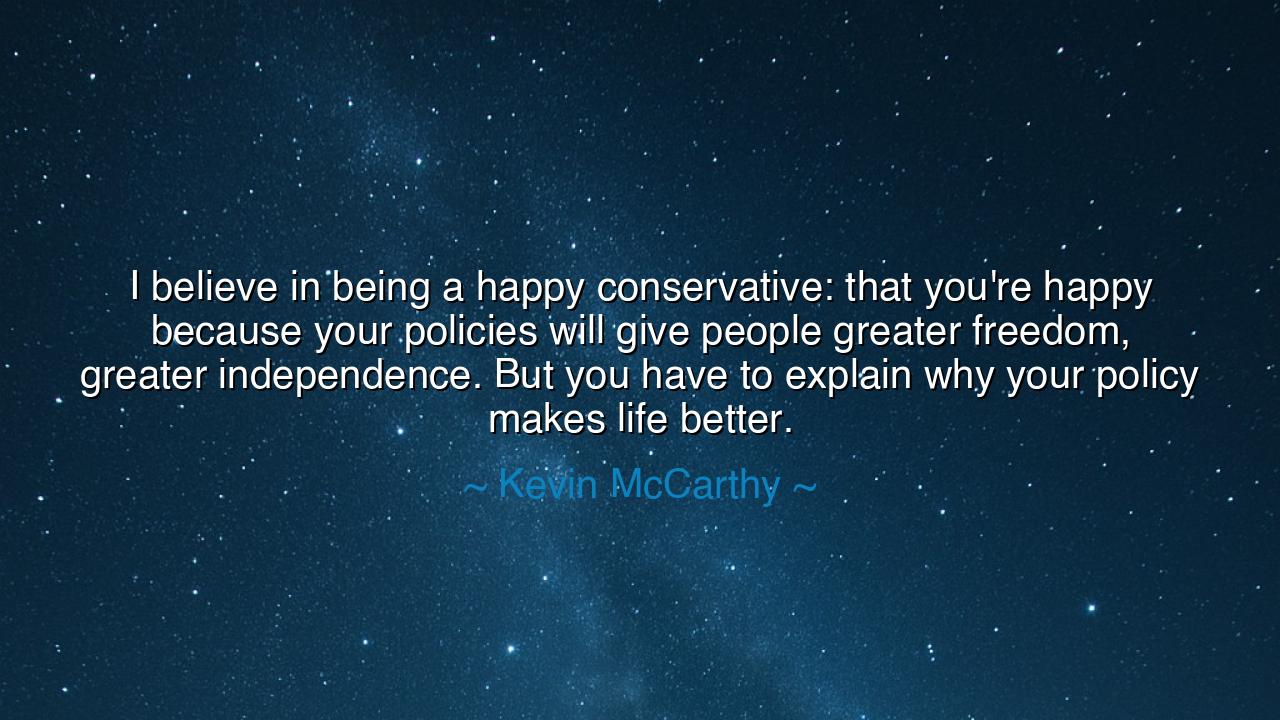
I believe in being a happy conservative: that you're happy
I believe in being a happy conservative: that you're happy because your policies will give people greater freedom, greater independence. But you have to explain why your policy makes life better.






"I believe in being a happy conservative: that you're happy because your policies will give people greater freedom, greater independence. But you have to explain why your policy makes life better." – Kevin McCarthy
Hear these words, O listeners of reason and heart, for in them lies not merely the voice of politics, but the essence of governance and leadership. When Kevin McCarthy, a figure of modern American statesmanship, spoke these words, he sought to remind both leaders and citizens that joy and conviction are not enemies. He declared that to serve as a happy conservative is to believe that the truest form of happiness springs from freedom — from a life lived without undue restraint, where individuals are trusted to shape their own destinies. This is not the hollow happiness of indulgence, but the profound satisfaction born of independence, responsibility, and purpose.
In his saying, McCarthy joins a long line of thinkers who saw freedom not as mere permission, but as a sacred trust. The happiness he speaks of is not a fleeting pleasure, but a noble contentment rooted in the belief that good policy serves the people by empowering them. It is the same spirit that guided the architects of democracy in every age — that men and women are most fulfilled when they are free to labor, to think, to worship, and to dream without coercion. Thus, McCarthy teaches that a leader’s joy must come not from power itself, but from the knowledge that his work helps others stand tall upon their own feet.
The origin of this idea reaches back to the very founding of the American republic. The authors of the Declaration of Independence wrote of the unalienable rights to “life, liberty, and the pursuit of happiness.” To them, happiness was not idleness, but virtue in motion — the fruit of a society where citizens are self-reliant yet bound by shared moral purpose. McCarthy’s vision echoes this inheritance: that the measure of any policy lies not in its power to control, but in its ability to liberate — to set free the creative, industrious, and moral spirit of the people.
Consider the example of Abraham Lincoln, whose leadership through the fire of the Civil War was guided by an unshakable belief in liberty’s power to renew a nation. He did not govern with bitterness or cynicism, but with a quiet and solemn joy, knowing that the freedom of others secured the soul of all. In his heart, he was a “happy conservative” in the truest sense — preserving the eternal principles of freedom while extending them to those long denied. His policies did not simply maintain a system; they transformed lives, restoring dignity where it had been lost.
McCarthy also reminds us of the leader’s duty to explain — for belief without clarity breeds division, and policy without understanding becomes tyranny by confusion. To lead is not only to act, but to teach. The wise statesman, therefore, does not command obedience through fear or rhetoric, but wins hearts through reason. The people must see how policy makes life better, how each law, reform, or vision is rooted in compassion as well as conviction. Leadership without empathy becomes despotism; conviction without joy becomes fanaticism.
And so, McCarthy’s words stand as a call to both leaders and followers. To the leader, he says: govern not with gloom, but with faith in human potential. Believe that men and women, when free, will rise to greatness if given the chance. To the citizen, he says: demand of your leaders not only strength, but wisdom; not only promises, but understanding. For democracy thrives when both rulers and ruled act from hope rather than fear.
Let this be the lesson for our time: that happiness and freedom are twin lights, guiding nations and souls alike. The true conservative — or indeed any true guardian of liberty — is one who protects independence not out of pride, but out of love for humanity’s creative spirit. And the truest joy a leader can know is to see a people no longer bound by dependence, but walking proudly in their own light. Thus, as Kevin McCarthy teaches, let every policy be measured not by its power to command, but by its power to uplift — for where freedom and independence thrive, there too does the radiant happiness of a free people endure.






AAdministratorAdministrator
Welcome, honored guests. Please leave a comment, we will respond soon